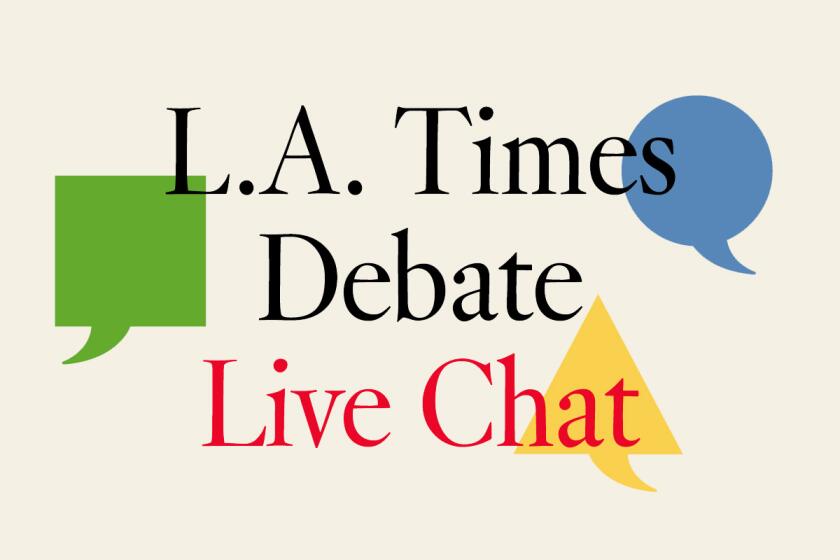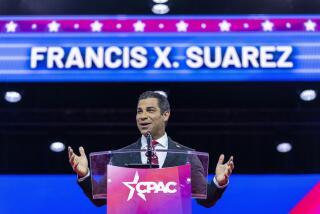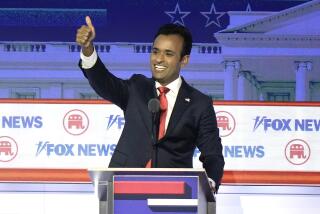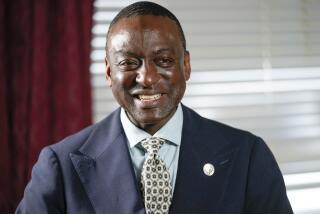As his first debate nears, Bloomberg is having to answer about his past
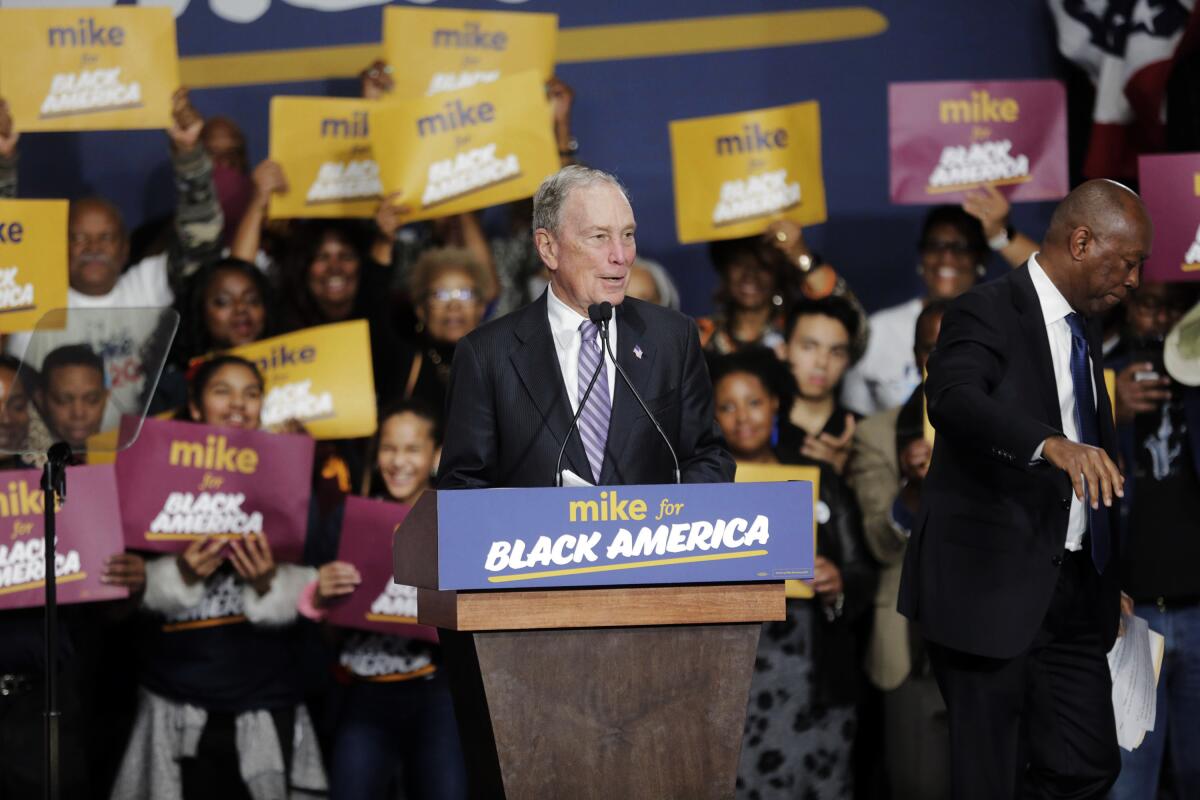
WASHINGTON — This is not the gracious welcome that billionaire Michael R. Bloomberg — who has poured towering piles of cash into liberal causes and candidates for more than a decade — has come to expect from prominent Democrats.
No, the former New York mayor’s debut in the top tier of the presidential race has turned brutal.
His rapid rise in the polls has brought Bloomberg a spot on the Democratic debate stage Wednesday in Nevada — a state where he is not even on the ballot. It has also earned him the start of a punishing vetting. Each day now, rivals unveil another ghost from his past.
Wednesday night’s debate — and the outcome of the March 3 Super Tuesday primaries in California and 13 other states — could turn on how effectively Bloomberg can respond to those allegations about his past when he is confronted with them in person, without a script and before a television audience of millions.
Billionaire former New York Mayor Michael Bloomberg faced attacks by other Democratic presidential candidates on the debate stage in Las Vegas on Wednesday night. Former Vice President Joe Biden, former South Bend, Ind., Mayor Pete Buttigieg, and Sens. Amy Klobuchar, Bernie Sanders and Elizabeth Warren also turned their fire on each other. The candidates sparred over healthcare, experience, sexism and transparency.
So far, he’s endured a tough stretch in which his campaign has had to do a lot of explaining.
Explaining why colleagues in the late 1980s attributed so many misogynistic remarks to him that in 1990 they memorialized the comments in a commemorative booklet titled “The Wit and Wisdom of Michael Bloomberg.”
“If women wanted to be appreciated for their brains, they would go to the library instead of Bloomingdale’s,” read one.
Bloomberg now denies he ever said any of that, but he also has admitted making disrespectful remarks over the years.
Explaining why he won’t release from confidentiality agreements female employees who sued his company for creating a hostile work environment.
Explaining why he argued as recently as 2015 that throwing young minorities “up against walls” and frisking them was a smart anti-crime policy.
Even an old video clip of Bloomberg opining on the simplicity of the agrarian age versus the complexities of the information age morphed into a communication headache this week.
“There are a lot of stories out there about him,” said Jim Rich, a former editor of the New York Daily News. “Whether it is his history with ‘stop-and-frisk’ policies or the litany of sexual harassment allegations against his company, it is somewhat shocking he still polls as strong as he does in the face of all of it.”
Since he entered the presidential race in late November, Bloomberg’s quick climb in polls has been built on relentlessly inundating voters nationwide with carefully sculpted advertisements and tightly controlled events in states where other campaigns barely had a presence.
The debate marks his debut as a candidate competing on the same terms as his rivals — for a night at least.
His opponents don’t lack for material to use.
Along with Democratic rivals, President Trump has gotten into the act, stepping up his trolling of the candidate he calls “Mini Mike.” Tuesday, on Twitter, Trump pointed to the former mayor’s lavish contributions to the causes and campaigns of so many politicians supporting him now.
“What Mini Mike is doing is nothing less than a large scale illegal campaign contribution,” Trump declared.
There is no evidence Bloomberg has violated any campaign finance laws.
“It is a big risk for Bloomberg to debate,” said Paul Begala, who was a longtime advisor to Bill and Hillary Clinton. “He has not debated since 2009, and that was against one opponent.”
Begala said the former mayor will need “to push past all the attacks” while at the same time “not get bogged down in the past.”
That past includes behavior and views that are very much out of step with today’s Democratic politics.
High on the list are the stop-and-frisk policies that Bloomberg championed during much of his tenure as mayor — a period in which violent crime declined sharply in the city but in which police stops of black and Latino young people skyrocketed.
Bloomberg has attempted to apologize for stop and frisk, saying that he failed at the time to realize the impact the policy had in minority communities.
But his effort hit a major hurdle last week when audio surfaced of remarks he made in 2015 to a group in Colorado. In the speech, first disclosed by the Aspen Times, the former mayor argued that 95% of “murders and murderers and murder victims” were young men of color.
“You can just take the description and Xerox it and pass it out to all the cops,” he said at the time, boasting of the success stop and frisk had in reducing homicides by getting guns off the street.
“And the way you get the guns out of the kids’ hands is to throw them up against the walls and frisk them,” he said then.
On Wednesday, fellow billionaire Tom Steyer of California, a rival in the presidential race, announced he would highlight those comments by Bloomberg in an ad that will be broadcast across Super Tuesday states beginning early next week.
Bloomberg said in a statement after the recording became public that the comments do not reflect his commitment to criminal justice reform, and he reiterated his regret that he allowed the stop-and-frisk policy to flourish.
Another clarification from the campaign came after the release of a 2008 video of a Bloomberg lecture at Georgetown University in which the billionaire suggested the financial crisis had been precipitated by government pressure on banks to stop the practice of “redlining” — discriminating against borrowers in poor, typically minority, neighborhoods.
“Congress got involved — local elected officials, as well — and said, ‘Oh that’s not fair, these people should be able to get credit,’” Bloomberg said.
“And once you started pushing in that direction, banks started making more and more loans where the credit of the person buying the house wasn’t as good as you would like,” he added, espousing a theory that was widespread at the time in the financial circles in which he travels.
Sen. Elizabeth Warren of Massachusetts quickly accused Bloomberg of arguing “the economy would be better off if we just let banks be more overtly racist.”
Bloomberg’s campaign countered that he fought redlining while mayor and his presidential platform focuses on boosting minority homeownership.
Warren, who has spent most of the race avoiding personal attacks, makes an exception for Bloomberg. She compares him to Trump. Bloomberg’s presence in the Las Vegas debate will give voters “a live demonstration of how we each take on an egomaniac billionaire,” she said Tuesday. Other candidates also have stepped up their attacks, many finding Bloomberg’s ability to bypass the early primary uniquely galling.
What voters will make of all this remains uncertain. None of the issues Bloomberg currently faces are new. The issues and allegations, including the accusations of demeaning remarks about women, came up when he successfully ran for mayor three times.
“He has been hit before,” said Hank Sheinkopf, who was a political advisor to Bloomberg in New York but is not working for his presidential campaign.
“There is nothing new to any of this. It is not career destroying. It can be a nuisance if gets repeated often enough. But Bloomberg can mitigate that in the Super Tuesday states by staying on the air. No way anyone can communicate with more intensity than him.”
“The guy has run three times successfully in a city with a bigger population than many states,” Sheinkopf said. “He is well equipped to handle this.”
Others who have tracked Bloomberg’s career see choppier waters ahead. Turnout in New York municipal elections is notoriously low, they say, and the billionaire has not confronted anything like the sustained attack that is just getting started in this presidential race.
One thing not in dispute: Bloomberg’s days floating above the fray are over.
More to Read
Get the L.A. Times Politics newsletter
Deeply reported insights into legislation, politics and policy from Sacramento, Washington and beyond. In your inbox three times per week.
You may occasionally receive promotional content from the Los Angeles Times.
